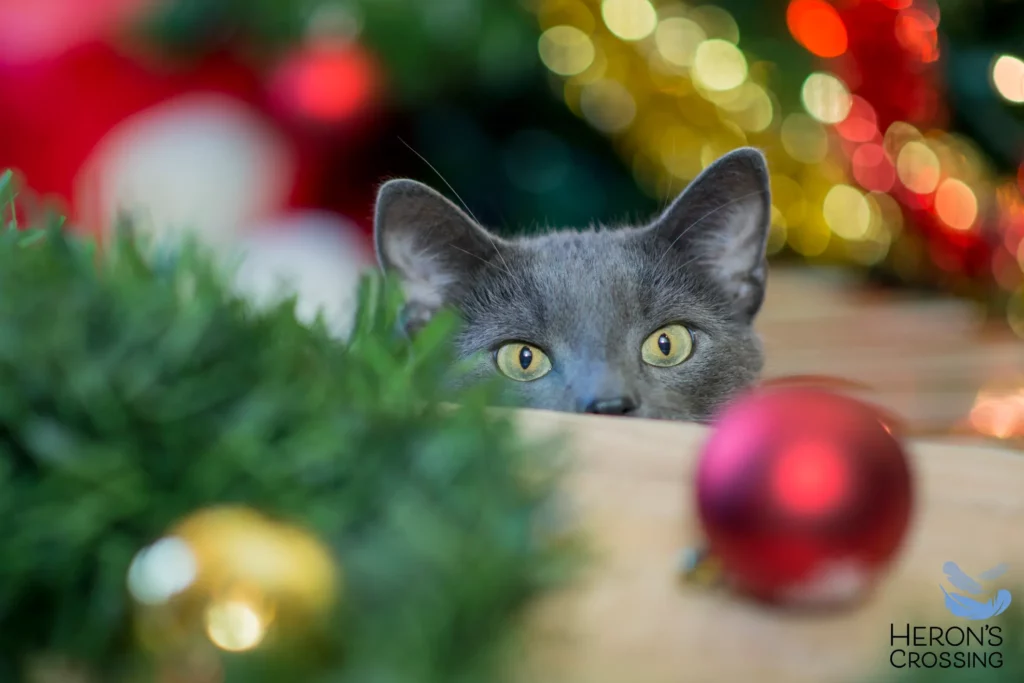When it comes to bringing in plants to decorate for the holidays, surely your curious cats will be nibbling leaves and petals to investigate.
Enticing berries, playful garlands, pretty flowers and shiny leaves – let alone a whole tree – may be too much for felines to resist, and many of them are toxic if ingested, causing anything from vomiting and diarrhea, to organ failure and sudden death.
Chances are your florist or gardening store clerk won’t know which plants can affect your pets. Cats are a great deal more susceptible to toxins than their canine counterparts, and nothing seems to be too high for them to reach, so even greater care must be taken by cat parents to make the holidays safe and happy for everyone.
The American Society for the Prevention of Cruelty to Animals (ASPCA) has the internet’s most comprehensive listing of plants and their toxicity to cats, dogs and horses. Using the ASPCA Toxic and Non-Toxic Plants List, you can search for a single plant, search an entire list for cats only, or even print an abbreviated list for shopping. However, the single search option does not offer alternatives if you spell incorrectly, so it might be easier to look up the plant alphabetically instead. The list includes photos to help identify the flower or greenery.
Yet there are still some plants that can bring in the colors of the season without a call to poison control. A search for holiday plants that are non-toxic to cats brings up 563 entries of such beauties as everyday roses, camellias, African violets, marigolds, alyssum and baby’s breath, bachelor buttons and bluebottles, China asters, Christmas cactus and red-blooming bromeliads.
Lilies of any kind cause kidney failure and death. However, orchids make a similar colorful, tall-standing substitute for your holiday displays, and they are almost all safe. Just check the ASPCA Toxic and Non-Toxic Plants List to make sure that a particular type of orchid is non-toxic before it becomes a part of the home.
Poinsettias have a sap that is burning and irritating to the mouth, throat and digestive tract, causing drooling, vomiting and diarrhea. Pet parents do better not to have this plant in the house.
Another problem is what kitty might mistake for another water bowl in the living room – the tree stand. Not only is it standing water that might harbor mold and bacteria, but it could include tree pesticides, sap and additives that are meant to make the tree stay fresh longer. This could kill your pets. Better to skip the additives and keep the stand tightly covered and blocked from access.
According to online research, at least 63% of commercial Christmas Trees are sprayed with pesticides. Possible alternatives are to locate places that sell cut or balled organic trees, find a homegrown tree at a local farmers market, or take a family day trip to visit an organic tree farm for a fresh tree. During non-COVID-19 years, tree farms often have hayrides, warm cider and hot chocolate, and other things to do outdoors to enjoy the season.
Since there is no ‘no fly’ zone for cats, check decorative plants that are even high up, such as floral arrangements on the table or the fireplace mantel. Mistletoe or holly may be hanging from the doorway, but berries dropped to the floor can dangerously slow your kitty’s heart rate and breathing to the point of death.
Holiday floral arrangements commonly use traditional holly, mistletoe, berries and greenery plus long-lasting florist’s favorites that are on the list of poisonous plants. The ASPCA list of toxic and non-toxic plants is a highly valuable resource to use in this situation as well. Ask the florist to name the plants in the composition, and check it against the ASPCA guide.
Here’s to a happy and healthy holiday! But if pet ingestion problems come up, here are some resources to call for immediate advice:
ASPCA Animal Poison Control Center Phone Number: (888) 426-4435
https://www.aspca.org/pet-care/animal-poison-control
Georgia Poison Center24/7 Animal Poison Control:
(855) 764-7661 https://www.petpoisonhelpline.com/
Please note that these hotlines have a per-incident fee similar to an office visit fee.
Heron’s Crossing provides end-of-life care for pets in the Metro Atlanta area. In-home appointments with compassionate vets are available. If you’d prefer a home-like setting away from your home, our Decatur office is also available by appointment.

